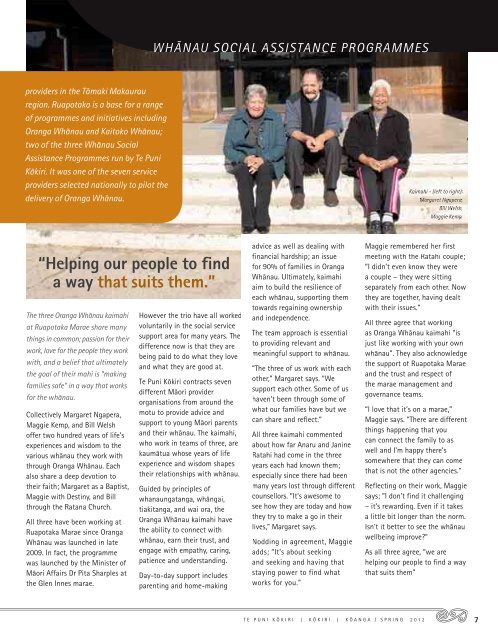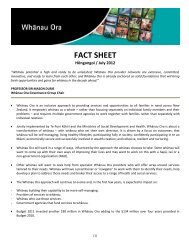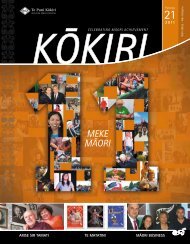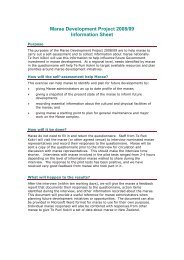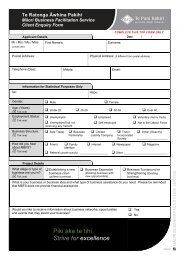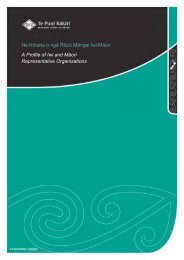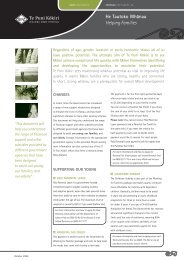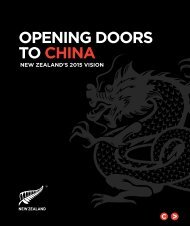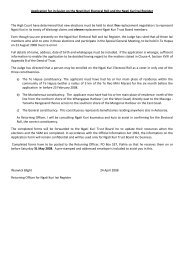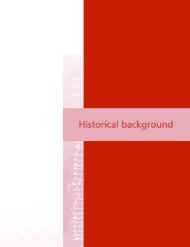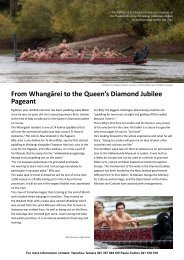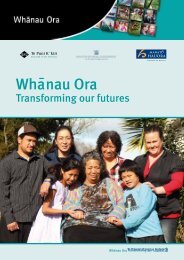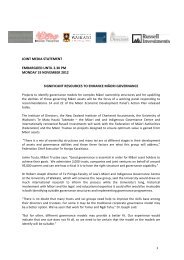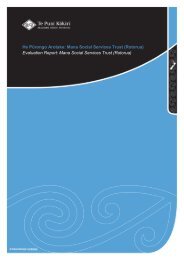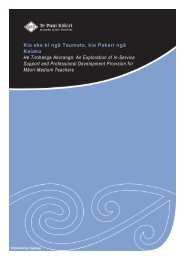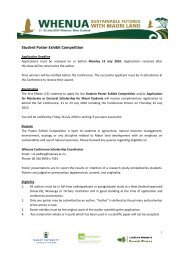Download the PDF (4.4MB) - Te Puni Kokiri
Download the PDF (4.4MB) - Te Puni Kokiri
Download the PDF (4.4MB) - Te Puni Kokiri
- No tags were found...
You also want an ePaper? Increase the reach of your titles
YUMPU automatically turns print PDFs into web optimized ePapers that Google loves.
WHÄNAU SOCIAL ASSISTANCE PROGRAMMESproviders in <strong>the</strong> Tämaki Makaurauregion. Ruapotaka is a base for a rangeof programmes and initiatives includingOranga Whänau and Kaitoko Whänau;two of <strong>the</strong> three Whänau SocialAssistance Programmes run by <strong>Te</strong> <strong>Puni</strong>Kökiri. It was one of <strong>the</strong> seven serviceproviders selected nationally to pilot <strong>the</strong>delivery of Oranga Whänau.Kaimahi - (lefttoright):MargaretNgapera,Bill Welslsh,Magggiegie Kempmp.“Helping our people to finda way that suits <strong>the</strong>m.”The three Oranga Whänau kaimahiat Ruapotaka Marae share manythings in common; passion for <strong>the</strong>irwork, love for <strong>the</strong> people <strong>the</strong>y workwith, and a belief that ultimately<strong>the</strong> goal of <strong>the</strong>ir mahi is “makingfamilies safe” in a way that worksfor <strong>the</strong> whänau.Collectively Margaret Ngapera,Maggie Kemp, and Bill Welshoffer two hundred years of life’sexperiences and wisdom to <strong>the</strong>various whänau <strong>the</strong>y work withthrough Oranga Whänau. Eachalso share a deep devotion to<strong>the</strong>ir faith; Margaret as a Baptist,Maggie with Destiny, and Billthrough <strong>the</strong> Ratana Church.All three have been working atRuapotaka Marae since OrangaWhänau was launched in late2009. In fact, <strong>the</strong> programmewas launched by <strong>the</strong> Minister ofMäori Affairs Dr Pita Sharples at<strong>the</strong> Glen Innes marae.However <strong>the</strong> trio have all workedvoluntarily in <strong>the</strong> social servicesupport area for many years. Thedifference now is that <strong>the</strong>y arebeing paid to do what <strong>the</strong>y loveand what <strong>the</strong>y are good at.<strong>Te</strong> <strong>Puni</strong> Kökiri contracts sevendifferent Mäori providerorganisations from around <strong>the</strong>motu to provide advice andsupport to young Mäori parentsand <strong>the</strong>ir whänau. The kaimahi,who work in teams of three, arekaumätua whose years of lifeexperience and wisdom shapes<strong>the</strong>ir relationships with whänau.Guided by principles ofwhanaungatanga, whängai,tiakitanga, and wai ora, <strong>the</strong>Oranga Whänau kaimahi have<strong>the</strong> ability to connect withwhänau, earn <strong>the</strong>ir trust, andengage with empathy, caring,patience and understanding.Day-to-day support includesparenting and home-makingadvice as well as dealing withfinancial hardship; an issuefor 90% of families in OrangaWhänau. Ultimately, kaimahiaim to build <strong>the</strong> resilience ofeach whänau, supporting <strong>the</strong>mtowards regaining ownershipand independence.The team approach is essentialto providing relevant andmeaningful support to whänau.“The three of us work with eacho<strong>the</strong>r,” Margaret says. “Wesupport each o<strong>the</strong>r. Some of ushaven’t been through some ofwhat our families have but wecan share and reflect.”All three kaimahi commentedabout how far Anaru and JanineRatahi had come in <strong>the</strong> threeyears each had known <strong>the</strong>m;especially since <strong>the</strong>re had beenmany years lost through differentcounsellors. “It’s awesome tosee how <strong>the</strong>y are today and how<strong>the</strong>y try to make a go in <strong>the</strong>irlives,” Margaret says.Nodding in agreement, Maggieadds; “It’s about seekingand seeking and having thatstaying power to find whatworks for you.”Maggie remembered her firstmeeting with <strong>the</strong> Ratahi couple;“I didn’t even know <strong>the</strong>y werea couple – <strong>the</strong>y were sittingseparately from each o<strong>the</strong>r. Now<strong>the</strong>y are toge<strong>the</strong>r, having dealtwith <strong>the</strong>ir issues.”All three agree that workingas Oranga Whänau kaimahi “isjust like working with your ownwhänau”. They also acknowledge<strong>the</strong> support of Ruapotaka Maraeand <strong>the</strong> trust and respect of<strong>the</strong> marae management andgovernance teams.“I love that it’s on a marae,”Maggie says. “There are differentthings happening that youcan connect <strong>the</strong> family to aswell and I’m happy <strong>the</strong>re’ssomewhere that <strong>the</strong>y can comethat is not <strong>the</strong> o<strong>the</strong>r agencies.”Reflecting on <strong>the</strong>ir work, Maggiesays; “I don’t find it challenging– it’s rewarding. Even if it takesa little bit longer than <strong>the</strong> norm.Isn’t it better to see <strong>the</strong> whänauwellbeing improve?”As all three agree, “we arehelping our people to find a waythat suits <strong>the</strong>m”TE PUNI KÖ KIRI | KÖ KIRI | KÖ ANGA / SPRING 20127


